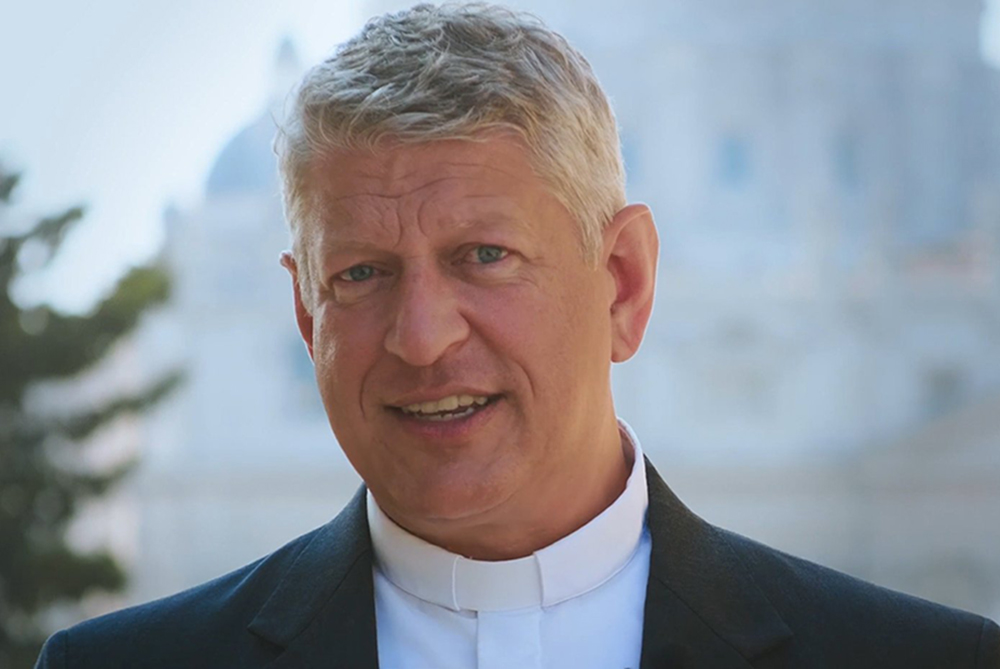
Jesuit Fr. David McCallum, executive director of the Program for Discerning Leadership, is seen in Rome in this undated photo. (CNS/Courtesy of Discerning Leadership)
In Pope Francis' "The Joy of the Gospel" — a 2013 document considered to be the blueprint for his papacy — he called for the church's mission to be "channeled for the evangelization of today's world rather than for her self-preservation."
A decade later, a newly established Jesuit initiative is training senior church leaders to put that goal into practice through a program aimed at strengthening the practical skills necessary for discernment and reform for a church that is more collaborative than hierarchical.
Founded in 2019, the Discerning Leadership program combines Ignatian spirituality with pioneering methodologies for polarity management and fostering communal growth. To date, its gatherings have brought together everyone from the Vatican's secretary of state, the pope's chief of staff, and women and men from every continent.
"It used to be the case that the past was a good predictor for the future," said Jesuit Fr. David McCallum, who serves as executive director of the program. "You would look in the rear view mirror and anticipate what the road ahead would look like."
"That's no longer the case," he told NCR. "And if we're going to be a viable institution for the future as church, we have to have the agility and the savvy of discernment to know what we stand for and what we can surrender."
Advertisement
McCallum, 54, previously served as the vice president for Mission Integration and Development at Le Moyne College in Syracuse, New York. In 2020, the American Jesuit moved to Rome to lead a program that was birthed out the Jesuit pope's call for his own order to take its expertise in spiritual discernment and to share it with the wider church.
Through a series of in-person workshops — both in Rome and as places far away as Manila, the Philippines — and distance learning programs, the Discerning Leadership courses offer religious women and men, priests, bishops and lay leaders a chance to first, better understand their own personal values and then how to improve their frameworks for examining a range of situations they may face in church leadership.
The idea, said McCallum, is to bolster an individual's practical skills, decision-making capacities, communication style and abilities to manage conflicts and navigate different cultures, all in an effort to foster communal growth.
In short, he says, it's "a movement to build a synodal church."
In fact, this October, when more than 400 Catholics from around the world gather in Rome for the first session of Francis' synod to discuss a number of issues facing the church in the modern world, McCallum will be one of the synod's experts (or facilitators) tasked with helping guide the conversations.
"If we want to be a viable influence in a global landscape that is very complicated, leaders have to operate differently as to how they handle stakeholders and people who think differently and people who are invested in common causes but are not religious," McCallum told NCR.
It's that philosophy he brings to both Discerning Leadership and will bring into the synod hall when a cross-section of the Catholic hierarchy and lay Catholic women and men meet for a month at the Vatican for what is sure to be an intense period of thinking about the future of the church.
"We can't do it in the same unilateral, hierarchical way of the past," said McCallum.
"We can't do it in the same unilateral, hierarchical way of the past."
— Jesuit Fr. David McCallum
While the pope has made synodality— a process that incorporates all of the people of God, not just the hierarchy — the centerpiece of his papacy and emphasized it as a new way of operating as a church, many church leaders lack the practical know-how to implement synodality in practice, McCallum said.
Discerning Leadership is trying to fill that void, and in just three years, the program now boasts nearly 500 alumni. Of that number, nearly 300 have been women, including a high number of women religious.
McCallum said that "women seemed more naturally disposed to leading participatory, communal fashion."
"Synodality," he added, "feels very challenging for those who are more comfortable with the patriarchal, hierarchical mode of control and authority."
The goal of the program, according to McCallum, is to provide leaders with a new template for what leadership looks like in a church that is synodal.
"We want to foster leadership that is rooted in the gospel and the way that Jesus demonstrates on how to use power and authority rather than fixated on the way in which the world tends to see these things," he said.
This, he said, is modeled after Jesus' example of service and responsibility and being open to discerning how the spirit is moving in the present day.
And the starting point — both for the program and October's synod — is from a place of humility.
It's a recognition, said McCallum, that "my take on the world is only partial, and I need to be in relationship with people who see and operate differently in the world in order to have a fuller view."








